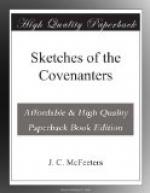The ministration of the Gospel of Jesus Christ—that river of God which makes glad the city of the Lord—had now reached the precipitous places where it was broken upon the rocks; yet it continued to flow, and even increase in volume and strength. The preaching by these ministers in the desolate places was powerful, impetuous, majestic, thunder-like amid the mountains, making the kingdom tremble. Great trials make great men.
We live in an easy age. Ministers may now have pulpit and salary on easy terms. They can preserve a good conscience without special self-denial. No providential issue now to separate the false from the true. But the ease of conscience in the Church’s ministry, and the easy terms of communion in her membership, may change God’s gold and make it dim with dross, and thus necessitate a furnace. The Lord may suddenly spring an event upon His Church, that will compel the true to be very true, and the false to be very false. Where will we stand in case the trial come?
* * * * *
Points for the class.
1. What effect had the death of Argyle and Guthrie on the Covenanters?
2. How does God keep His Church pure?
3. Why is the sifting process needed?
4. Can the Church survive the loss of her external organization?
5. Describe the Covenanted Church in the mountains and moors of Scotland.
6. What did the king require of the ministers?
7. How did the Covenanters receive his restrictions?
8. How many pastors were driven from their churches?
9. What may again occasion a sifting time?
XXVI.
The field-meetings.—A.D. 1663.
Middleton, the king’s commissioner, had dictated to the Covenanted ministers how they should conduct their ministry. They boldly declined his authority over their work in the Gospel. He then laid down conditions upon which their pastoral relation must depend. These conditions have been stated in the foregoing chapter. They may be summed up in three brief sentences: Acknowledgement of the king’s supremacy over the Church; Agreement to refrain from all public criticism of the king; Willingness to conduct public worship as the king directed.
Such were the terms on which the Covenanted ministers might continue their work. They were given one month to reach a decision. The conflict of interests that tried the famous 400 ministers none knew but God. Home, wife, children, salary, comfort, tender ties, future supplies, and the welfare of the congregation—oh, how much was involved in that decision! Can the husband, the father, the shepherd, the watchman arise and forsake all? Can he suspend the high calling, sunder the holy ties, abandon the field and flock, and go forth, not knowing whither he goeth? can flesh and blood endure the ordeal?




